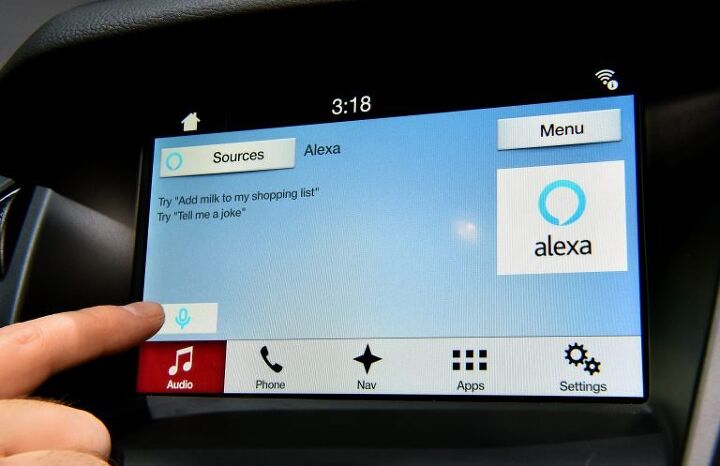Listen Up: Amazon Putting Alexa Into More Automobiles

Amazon is striving to put Alexa, the home assistant/listening device, into more automobiles in the coming years. As a result, the company is working feverishly to enhance her vehicular-related capabilities — including wriggling her way into the embedded software systems of new cars.
On the surface, it sounds great. Networking your car with your smart home device opens up a bevy of new conveniences and Alexa should also help your car get better at understanding everyday voice commands. In the future, you’ll be able to order groceries, check the stock market, call the office, and adjust the thermostat of your house and car without ever having to take your hands off the steering wheel. But this also opens up a bevy of concerns, now that we know Amazon’s employees listen to and record pretty much everything you say to the device — sometimes doing the same for background conversations that were never intended for Alexa’s ears.
Officially, this is being done so Amazon can fine tune the system and make it better equipped to handle complex voice commands. But, unofficially, it’s super-duper creepy to think that 100 million people have voluntarily bought a corporate listening device that’s now angling to get inside your automobile. That’s not to point the finger at Amazon specifically, as any networked device with a microphone is capable of similar shenanigans. But Amazon’s Alexa/Echo have been the ones getting the most press for listening in — with Google receiving similar attention after leaks surfaced in Belgium.
While you can adjust your privacy setting and have your voice recordings deleted, Amazon does not do away with the the text transcripts of whatever you’ve said. That doesn’t really address the existing privacy concerns as no one seems to have an a definitive answer as to where the information goes, how its stored, and who gets to see it. While nobody here is suggesting it’s being intentionally collected for nefarious purposes, at least not by Amazon, it certainly could be in the future.
Amazon has basically said it needs to be able to do this to make sure its AI system continues getting better and tries to keep things anonymous. Google agreed. “As part of our work to develop speech technology for more languages, we partner with language experts around the world who understand the nuances and accents of a specific language,” David Monsees, product manager for Google Search, said in a blog post on Thursday. “These language experts review and transcribe a small set of queries to help us better understand those languages. This is a critical part of the process of building speech technology, and is necessary to creating products like the Google Assistant.”
He also said employees only review around 0.2 percent of all audio snippets captured and are “directed not to transcribe background conversations or other noises, and only to transcribe snippets that are directed to Google.” That still means they can hear them, even if they’re not supposed to be actively listening. That’d be a little easier to endure if Google wasn’t already a gigantic company mired by accusations of political bias and unwarranted censorship.
In the automotive sphere, Amazon starting working directly with OEMs in 2016. The company said it would eventually like to see Alexa to become ubiquitous. “The real North Star for us is to be embedded with all the cars,” Ned Curic, vice president of Amazon Alexa Automotive, told Automotive News this week. “That’s where we want to get. We’re working very hard to get there because we believe that is the best experience.”
From Automotive News:
Curic declined to comment on how many automakers Amazon is in discussions with about embedding Alexa into their vehicles but said consumers should expect “a significant number of vehicles having access to Alexa” in the coming years.
Audi and BMW Group, including the Mini brand, are the first to begin installing Alexa into their vehicles’ software system.
While the German’s have already pulled the trigger — you can buy Alexa-equipped cars from both BMW and Audi — other manufacturers have already expressed an interest, added Alexa/Echo by other means (e.g. Ford, Hyundai, GM), or previewed similar systems without Amazon’s involvement.
The benefits are obvious. Truly effective voice commands free up drivers from having to interact with a potentially distracting screen. That’s important for safety reasons and also opens up more opportunities to shop while driving — likely making automakers and their partners a lot of side cash as they switch to a mobility/tech business model. Unfortunately, there doesn’t appear to be a good way to protect people’s privacy as this takes place. The very nature of these systems involve insane amounts of data acquisition, some of which will undoubtedly be leaked, stolen, or sold, and there’s no way around it.
How freaked out do we think you should be? Maybe a little. But the fact remains that a car transmitting your conversations out into the either is probably not as big of a deal as your phone/house doing the same. We just hope automakers don’t attempt to make this standard equipment — otherwise, we’re betting vintage cars will become all the rage with a large subset of shoppers who value privacy over convenience.
[Image: Ford Motor Co.]

A staunch consumer advocate tracking industry trends and regulation. Before joining TTAC, Matt spent a decade working for marketing and research firms based in NYC. Clients included several of the world’s largest automakers, global tire brands, and aftermarket part suppliers. Dissatisfied with the corporate world and resentful of having to wear suits everyday, he pivoted to writing about cars. Since then, that man has become an ardent supporter of the right-to-repair movement, been interviewed on the auto industry by national radio broadcasts, driven more rental cars than anyone ever should, participated in amateur rallying events, and received the requisite minimum training as sanctioned by the SCCA. Handy with a wrench, Matt grew up surrounded by Detroit auto workers and managed to get a pizza delivery job before he was legally eligible. He later found himself driving box trucks through Manhattan, guaranteeing future sympathy for actual truckers. He continues to conduct research pertaining to the automotive sector as an independent contractor and has since moved back to his native Michigan, closer to where the cars are born. A contrarian, Matt claims to prefer understeer — stating that front and all-wheel drive vehicles cater best to his driving style.
More by Matt Posky
Latest Car Reviews
Read moreLatest Product Reviews
Read moreRecent Comments
- Calrson Fan Jeff - Agree with what you said. I think currently an EV pick-up could work in a commercial/fleet application. As someone on this site stated, w/current tech. battery vehicles just do not scale well. EBFlex - No one wanted to hate the Cyber Truck more than me but I can't ignore all the new technology and innovative thinking that went into it. There is a lot I like about it. GM, Ford & Ram should incorporate some it's design cues into their ICE trucks.
- Michael S6 Very confusing if the move is permanent or temporary.
- Jrhurren Worked in Detroit 18 years, live 20 minutes away. Ren Cen is a gem, but a very terrible design inside. I’m surprised GM stuck it out as long as they did there.
- Carson D I thought that this was going to be a comparison of BFGoodrich's different truck tires.
- Tassos Jong-iL North Korea is saving pokemon cards and amibos to buy GM in 10 years, we hope.


































Comments
Join the conversation
Does it come with direct link to FBI cloud storage?
"Alexa, give the finger to that guy who just cut me off....".